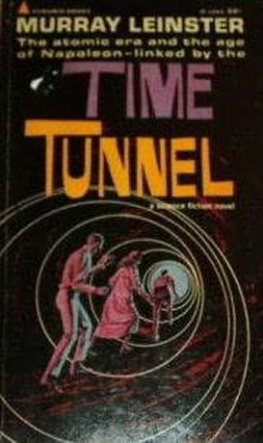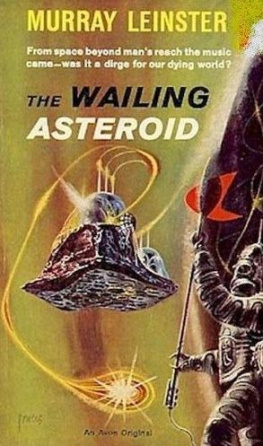Murray Leinster - The Time Tunnel
Here you can read online Murray Leinster - The Time Tunnel full text of the book (entire story) in english for free. Download pdf and epub, get meaning, cover and reviews about this ebook. year: 1964, publisher: Pyramid Books, genre: Art. Description of the work, (preface) as well as reviews are available. Best literature library LitArk.com created for fans of good reading and offers a wide selection of genres:
Romance novel
Science fiction
Adventure
Detective
Science
History
Home and family
Prose
Art
Politics
Computer
Non-fiction
Religion
Business
Children
Humor
Choose a favorite category and find really read worthwhile books. Enjoy immersion in the world of imagination, feel the emotions of the characters or learn something new for yourself, make an fascinating discovery.
- Book:The Time Tunnel
- Author:
- Publisher:Pyramid Books
- Genre:
- Year:1964
- Rating:5 / 5
- Favourites:Add to favourites
- Your mark:
- 100
- 1
- 2
- 3
- 4
- 5
The Time Tunnel: summary, description and annotation
We offer to read an annotation, description, summary or preface (depends on what the author of the book "The Time Tunnel" wrote himself). If you haven't found the necessary information about the book — write in the comments, we will try to find it.
The Time Tunnel — read online for free the complete book (whole text) full work
Below is the text of the book, divided by pages. System saving the place of the last page read, allows you to conveniently read the book "The Time Tunnel" online for free, without having to search again every time where you left off. Put a bookmark, and you can go to the page where you finished reading at any time.
Font size:
Interval:
Bookmark:
The affair of the time-tunnel began, so far as Harrison was concerned, with a series of events so improbable as to seem lunacy, but which appear to have been inevitable. In a cosmos designed to have human beings live in it, though, there would have to be some sort of safeguards against the consequences of their idiocy. The time-tunnel may have been such a safeguard. To some people, that seems a reasonable guess.
It was a brisk, sunshiny Parisian afternoon when the matter really turned up. Harrison sat at a sidewalk table outside the little cafe in the Rue Flamel. He'd never happened to notice its name. He sipped at an aperitif, thinking hard and trying not to believe what he was thinking about. He'd come from the Bibliotheque Nationale a good how before. Today he'd found more of the completely incredible. He didn't believe it, but he knew it was true. His series of discoveries had reached the point where he simply couldn't tell himself any longer that they were coincidences. They weren't. And their implications were of a kind to make cold chills run up and down anybody's spine. A really sensible man would have torn up his notes, gotten drunk to confuse his memories, and then departed 7 on the earliest possible plane for home. There he would have denied to himself forever after that he had found what Harrison had discovered in the dusty manuscript section of the Bibliotheque Nationale. But Harrison sipped at a drink and noted the small cold chills running up and down his spine. He resented them because he didn't believe in what caused them. But there they were. They had to do with the cosmos in general. Most men develop convictions about the cosmos and such beliefs come in two varieties. One kind is a conviction that the cosmos does not make sense. That it exists by chance and changes by chance and human beings do not matter. This view produces a fine complacency. The other kind is a belief that the cosmos does make sense, and was designed with the idea that people were going to live in it, and that what they do and what happens to them is important. This theory seems to be depressing. Harrison had accepted the second view, but he was beginning to be frightened because of what he'd found in dusty, quill-pen-written pages in a library reading room. And he didn't like to be frightened. It was a very pleasant autumn afternoon, though. Leaves had been falling, and they blew erratically about the pavement in appropriate fall colorings, and the sky showed through the nearly denuded branches of the trees that lined the Rue Flamel. There was nobody on the sidewalks. For minutes there had been no traffic going past the small cafe. It was just cold enough so that Harrison was the only customer at any of the outdoor tables. Around him there were houses which had stood in their places for centuries and thereby acquired a self-satisfied air. From high overhead there came a rumbling, distant thunder. A jet had made the sound, but there was no use in trying to sight it. It had left its noise-trail far behind. It was now undoubtedly hidden by roofs or chimney-pots. Then, at last, someone did come down the street. It was an extremely improbable occurrence, not that somebody should walk down the street, but who it happened to be. The odds against anything that actually happens are always enormous, when one considers the number of other things that could have happened instead. But certainly the odds were incalculably great that Pope Ybarra, who had been at Brevard University with Harrison and had shared one course in statistical analysis with him, would not be walking down the Rue Flamel at this particular moment, when Harrison had come upon the preposterous and doubted his own sanity. But there he was. He came briskly toward the cafe. Harrison hadn't seen him for four years. The last time had been in Uxbridge, Pennsylvania, when Pepe was being hauled out of the Roland River by an also-dripping policeman who was going to arrest him within minutes, but was forced to accept Pepe's warmly grateful handshake beforehand. Now he was walking down the Rue Flamel on an autumn afternoon. It was not a probable occurrence, but it was the kind of thing that happens.
He greeted Harrison with a glad outcry.
"For the love of heaven! What are you doing here? Where've you been? What gives? How long have you been in Paris? Do you know any interesting girls?" Harrison shook hands and Pepe dropped into a chair opposite him. He regarded Harrison with approving eyes.
"I've been here for two months," said Harrison wrily. "I don't know any girls, and I think I'm going to try to forget what I came for."
Pepe rapped on the table. He ordered a drink over his shoulder. To Harrison he said warmly, "Now we have fun! Where are you living? What are you doing? Why don't you knotJeany girls?"
"I've been busy," said Harrison. He explained. "I've an elderly aunt. She offered to stake me to a Ph.D. And she said that since I lived here when I was a small boyuntil I was twelve1 ought to try to get back my French. And I had a crazy sort of idea that fitted into the proposal. It was something Professor Carroll said once in a lecture. Remember him? So I came over to get back my French and dig up the material for my thesis. My aunt is pleased. I wish I'd never thought of it." Harrison was silent a moment. Then he changed the subject. "What have you been doing?" Pepe sketched, with enthusiasm, his activities since Harrison had last seen him. He'd been home in Mexico. For a while he was in Tehuantepec. She was a lovely girl! Then he'd been in Tegucigalpa. She was charming! And then he'd been in Aguascalientes, and the name fitted! She was una rubaya, a red-head. Mmmmmmmh! But there'd been trouble there. His family had sent him to France until the affair blew over. Now he was being very virtuous. Seriously, what was Harrison doing in Paris?
"I've been digging," said Harrison, "in the manuscript section of the Bibliotheque Nationale. Did you know, Pepe, that a century and a half before Pasteur, there was someone who described in detail the idea that living things too small to be seengerms, in factcould be responsible for contagious diseases?"*
Pepe accepted his drink, beaming. He nodded as he put it to his lips. Overhead, the dull rumble of the jet-sound died gradually away. A taxicab crossed the Rue Flamel at the next corner. Blowing fallen leaves made faint whispering sounds on the pavement.
"Pues?" said Pepe. He put down his glass. "What of it?"
"That's a freak," said Harrison. "But I just found in Cuvier's notesthe naturalist, you knowthat in 1804 a man named de Bassompierre wrote him a theory which might be of interest to a savant concerned with natural history. And he outlined, very clearly and simply, the Mendelian laws of heredity. But it happened to be more than half a century before Mendel discovered them."
Pepe said, "That is not a freak?"
"No," said Harrison with some grimness. "Last week I found in the laboratory notes of Amperethe man who discovered so much about electricity, you knowthat someone named de Bassompierre wrote him in 1805 to tell him very respectfully that there were such things as alternating currents. He explained in words of one syllable how they could be generated and what they could be used for." Pepe raised his eyebrows.
"This Bassompierre," he observed, "was quite a character! You interest me strangely. In tact..."
"He was more than a character," said Harrison. "He wrote to Laplace, the astronomer, assuring him that Mars had two moons, very small and very close to its surface. He also said that there were three planets beyond Saturn, and that the one next out had a period of eighty-four years and two moons, one retrograde. He suggested that it should be called Uranus. He added that in the year 1808 there would be a nova in Persis, (which there was!) and he signed himself very respectfully, de Bassompierre."
Font size:
Interval:
Bookmark:
Similar books «The Time Tunnel»
Look at similar books to The Time Tunnel. We have selected literature similar in name and meaning in the hope of providing readers with more options to find new, interesting, not yet read works.
Discussion, reviews of the book The Time Tunnel and just readers' own opinions. Leave your comments, write what you think about the work, its meaning or the main characters. Specify what exactly you liked and what you didn't like, and why you think so.



